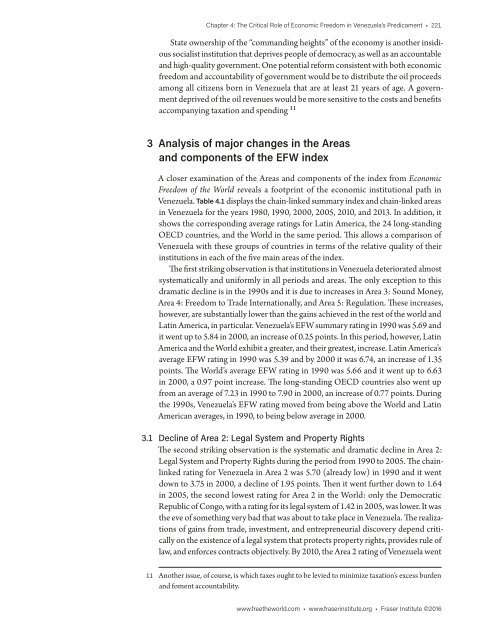Economic Freedom of the World
economic-freedom-of-the-world-2016
economic-freedom-of-the-world-2016
You also want an ePaper? Increase the reach of your titles
YUMPU automatically turns print PDFs into web optimized ePapers that Google loves.
Chapter 4: The Critical Role <strong>of</strong> <strong>Economic</strong> <strong>Freedom</strong> in Venezuela’s Predicament • 221<br />
State ownership <strong>of</strong> <strong>the</strong> “commanding heights” <strong>of</strong> <strong>the</strong> economy is ano<strong>the</strong>r insidious<br />
socialist institution that deprives people <strong>of</strong> democracy, as well as an accountable<br />
and high-quality government. One potential reform consistent with both economic<br />
freedom and accountability <strong>of</strong> government would be to distribute <strong>the</strong> oil proceeds<br />
among all citizens born in Venezuela that are at least 21 years <strong>of</strong> age. A government<br />
deprived <strong>of</strong> <strong>the</strong> oil revenues would be more sensitive to <strong>the</strong> costs and benefits<br />
accompanying taxation and spending 11<br />
3 Analysis <strong>of</strong> major changes in <strong>the</strong> Areas<br />
and components <strong>of</strong> <strong>the</strong> EFW index<br />
A closer examination <strong>of</strong> <strong>the</strong> Areas and components <strong>of</strong> <strong>the</strong> index from <strong>Economic</strong><br />
<strong>Freedom</strong> <strong>of</strong> <strong>the</strong> <strong>World</strong> reveals a footprint <strong>of</strong> <strong>the</strong> economic institutional path in<br />
Venezuela. Table 4.1 displays <strong>the</strong> chain-linked summary index and chain-linked areas<br />
in Venezuela for <strong>the</strong> years 1980, 1990, 2000, 2005, 2010, and 2013. In addition, it<br />
shows <strong>the</strong> corresponding average ratings for Latin America, <strong>the</strong> 24 long-standing<br />
OECD countries, and <strong>the</strong> <strong>World</strong> in <strong>the</strong> same period. This allows a comparison <strong>of</strong><br />
Venezuela with <strong>the</strong>se groups <strong>of</strong> countries in terms <strong>of</strong> <strong>the</strong> relative quality <strong>of</strong> <strong>the</strong>ir<br />
institutions in each <strong>of</strong> <strong>the</strong> five main areas <strong>of</strong> <strong>the</strong> index.<br />
The first striking observation is that institutions in Venezuela deteriorated almost<br />
systematically and uniformly in all periods and areas. The only exception to this<br />
dramatic decline is in <strong>the</strong> 1990s and it is due to increases in Area 3: Sound Money,<br />
Area 4: <strong>Freedom</strong> to Trade Internationally, and Area 5: Regulation. These increases,<br />
however, are substantially lower than <strong>the</strong> gains achieved in <strong>the</strong> rest <strong>of</strong> <strong>the</strong> world and<br />
Latin America, in particular. Venezuela’s EFW summary rating in 1990 was 5.69 and<br />
it went up to 5.84 in 2000, an increase <strong>of</strong> 0.25 points. In this period, however, Latin<br />
America and <strong>the</strong> <strong>World</strong> exhibit a greater, and <strong>the</strong>ir greatest, increase. Latin America’s<br />
average EFW rating in 1990 was 5.39 and by 2000 it was 6.74, an increase <strong>of</strong> 1.35<br />
points. The <strong>World</strong>’s average EFW rating in 1990 was 5.66 and it went up to 6.63<br />
in 2000, a 0.97 point increase. The long-standing OECD countries also went up<br />
from an average <strong>of</strong> 7.23 in 1990 to 7.90 in 2000, an increase <strong>of</strong> 0.77 points. During<br />
<strong>the</strong> 1990s, Venezuela’s EFW rating moved from being above <strong>the</strong> <strong>World</strong> and Latin<br />
American averages, in 1990, to being below average in 2000.<br />
3.1 Decline <strong>of</strong> Area 2: Legal System and Property Rights<br />
The second striking observation is <strong>the</strong> systematic and dramatic decline in Area 2:<br />
Legal System and Property Rights during <strong>the</strong> period from 1990 to 2005. The chainlinked<br />
rating for Venezuela in Area 2 was 5.70 (already low) in 1990 and it went<br />
down to 3.75 in 2000, a decline <strong>of</strong> 1.95 points. Then it went fur<strong>the</strong>r down to 1.64<br />
in 2005, <strong>the</strong> second lowest rating for Area 2 in <strong>the</strong> <strong>World</strong>: only <strong>the</strong> Democratic<br />
Republic <strong>of</strong> Congo, with a rating for its legal system <strong>of</strong> 1.42 in 2005, was lower. It was<br />
<strong>the</strong> eve <strong>of</strong> something very bad that was about to take place in Venezuela. The realizations<br />
<strong>of</strong> gains from trade, investment, and entrepreneurial discovery depend critically<br />
on <strong>the</strong> existence <strong>of</strong> a legal system that protects property rights, provides rule <strong>of</strong><br />
law, and enforces contracts objectively. By 2010, <strong>the</strong> Area 2 rating <strong>of</strong> Venezuela went<br />
11 Ano<strong>the</strong>r issue, <strong>of</strong> course, is which taxes ought to be levied to minimize taxation’s excess burden<br />
and foment accountability.<br />
www.free<strong>the</strong>world.com • www.fraserinstitute.org • Fraser Institute ©2016


